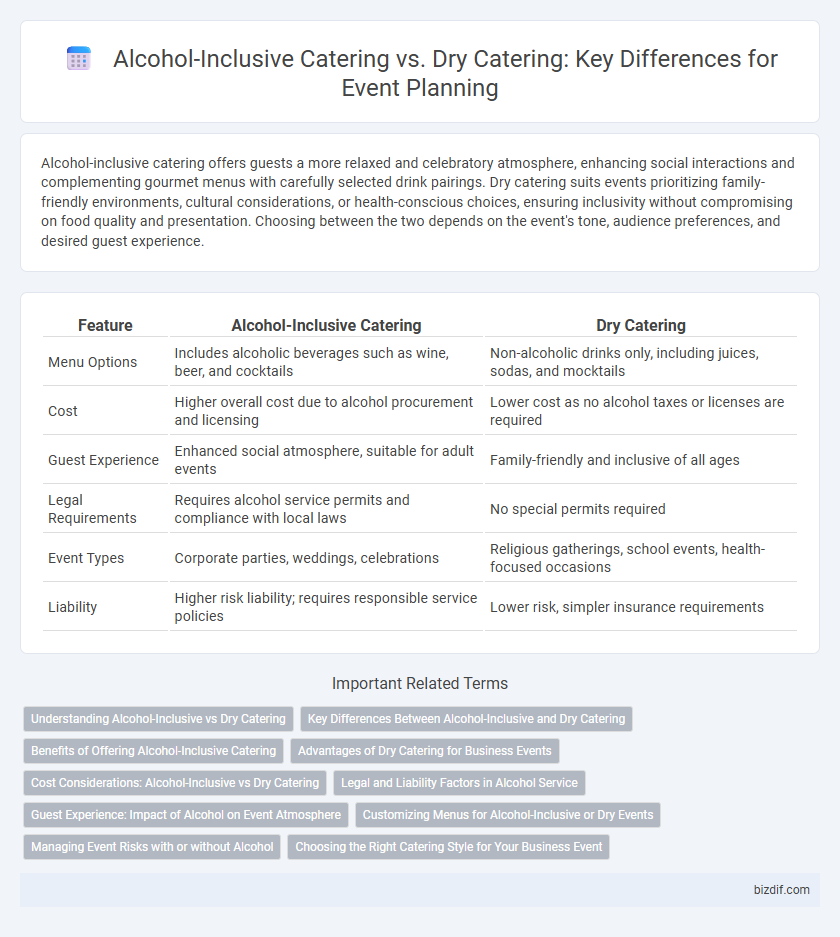Alcohol-inclusive catering offers guests a more relaxed and celebratory atmosphere, enhancing social interactions and complementing gourmet menus with carefully selected drink pairings. Dry catering suits events prioritizing family-friendly environments, cultural considerations, or health-conscious choices, ensuring inclusivity without compromising on food quality and presentation. Choosing between the two depends on the event's tone, audience preferences, and desired guest experience.
Table of Comparison
| Feature | Alcohol-Inclusive Catering | Dry Catering |
|---|---|---|
| Menu Options | Includes alcoholic beverages such as wine, beer, and cocktails | Non-alcoholic drinks only, including juices, sodas, and mocktails |
| Cost | Higher overall cost due to alcohol procurement and licensing | Lower cost as no alcohol taxes or licenses are required |
| Guest Experience | Enhanced social atmosphere, suitable for adult events | Family-friendly and inclusive of all ages |
| Legal Requirements | Requires alcohol service permits and compliance with local laws | No special permits required |
| Event Types | Corporate parties, weddings, celebrations | Religious gatherings, school events, health-focused occasions |
| Liability | Higher risk liability; requires responsible service policies | Lower risk, simpler insurance requirements |
Understanding Alcohol-Inclusive vs Dry Catering
Alcohol-inclusive catering provides a comprehensive service with a variety of alcoholic beverages such as wine, beer, and cocktails, enhancing guest experience at events like weddings and corporate functions. Dry catering excludes alcoholic drinks, focusing on non-alcoholic beverages and food options, ideal for family gatherings, corporate meetings, and religious or cultural events where alcohol consumption is restricted. Choosing between alcohol-inclusive and dry catering depends on event type, guest preferences, budget considerations, and compliance with venue policies or legal regulations.
Key Differences Between Alcohol-Inclusive and Dry Catering
Alcohol-inclusive catering offers a wide selection of wines, beers, and spirits, enhancing guest experience with customizable drink options tailored to event themes and preferences. Dry catering emphasizes non-alcoholic beverages such as juices, sodas, and mocktails, catering to guests with dietary restrictions, religious practices, or health considerations. Budget allocation, legal permits, and liability insurance are significant factors differentiating alcohol-inclusive catering from dry catering, impacting event planning and overall costs.
Benefits of Offering Alcohol-Inclusive Catering
Offering alcohol-inclusive catering enhances guest experience by providing a wider variety of beverage choices that complement the menu, increasing overall satisfaction and event enjoyment. It encourages social interaction and celebration, making corporate events, weddings, and parties more memorable and engaging. Providing certified bartenders ensures responsible service, balancing enjoyment with safety and compliance.
Advantages of Dry Catering for Business Events
Dry catering offers distinct advantages for business events by eliminating alcohol-related risks such as liability issues and impaired judgment among attendees. It fosters a professional atmosphere conducive to networking and clear communication, enhancing productivity and focus throughout the event. Cost savings also arise from not purchasing alcohol, allowing budgets to be allocated towards higher-quality food, decor, or entertainment options, improving overall event value.
Cost Considerations: Alcohol-Inclusive vs Dry Catering
Alcohol-inclusive catering typically incurs higher costs due to the purchase, licensing, and responsible service of alcoholic beverages, which may also require additional staff for bartending and monitoring consumption. Dry catering, without alcohol, generally reduces expenses by eliminating liquor purchase and related overhead, making it a more budget-friendly option for events. Event planners should weigh these cost differences against guest preferences and event type to optimize budget allocation effectively.
Legal and Liability Factors in Alcohol Service
Alcohol-inclusive catering requires compliance with local liquor licensing laws, which regulate who can serve alcohol and where it can be consumed. Liability factors are heightened in alcohol service, as hosts and caterers may be held responsible for over-serving or underage drinking, necessitating careful staff training and insurance coverage. Dry catering eliminates these risks, reducing legal complications and potential liabilities related to alcohol consumption.
Guest Experience: Impact of Alcohol on Event Atmosphere
Alcohol-inclusive catering often enhances the event atmosphere by fostering social interaction and elevating guest mood, contributing to a lively and engaging environment. Dry catering, while promoting a more controlled and family-friendly setting, may result in a more subdued ambiance. The choice between these options significantly influences guest comfort, event dynamics, and overall experience.
Customizing Menus for Alcohol-Inclusive or Dry Events
Customizing menus for alcohol-inclusive catering involves pairing food items that complement various beverages, enhancing flavor profiles and guest experience. Dry catering requires creative menu options that offer sophisticated, non-alcoholic alternatives while balancing taste and presentation. Tailoring the menu to the event's alcohol policy ensures optimal guest satisfaction and seamless service.
Managing Event Risks with or without Alcohol
Managing event risks with alcohol-inclusive catering requires strict adherence to legal drinking age enforcement, professional bartenders, and clear policies on overconsumption to prevent liability issues and ensure guest safety. Dry catering eliminates risks associated with alcohol intoxication, reducing potential incidents such as accidents or conflicts, while necessitating alternative engagement strategies to maintain guest enjoyment. Careful consideration of venue policies and guest demographics shapes the choice between alcohol-inclusive and dry catering to optimize safety and compliance.
Choosing the Right Catering Style for Your Business Event
Selecting the appropriate catering style for your business event hinges on the preferences and expectations of your guests, as well as the event's tone and objectives. Alcohol-inclusive catering offers a sophisticated atmosphere and can enhance networking opportunities, while dry catering ensures a family-friendly and inclusive environment suitable for diverse audiences. Evaluating the nature of the event, budget constraints, and local regulations helps determine whether alcohol should be included to align with your business's professional image and guest satisfaction.
Alcohol-Inclusive Catering vs Dry Catering Infographic

 bizdif.com
bizdif.com